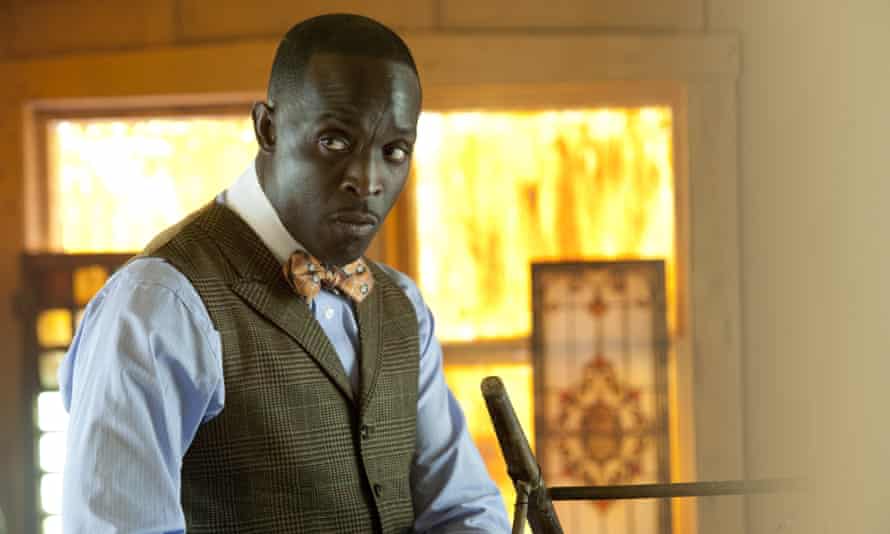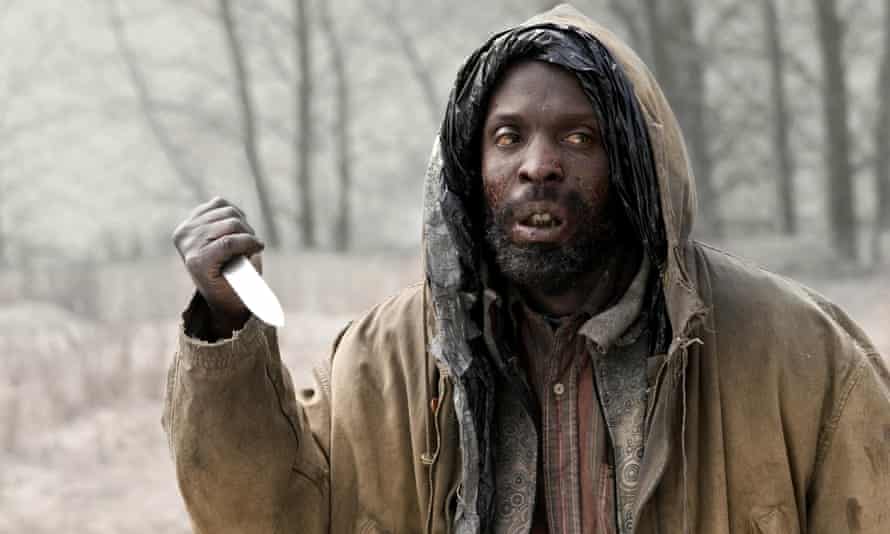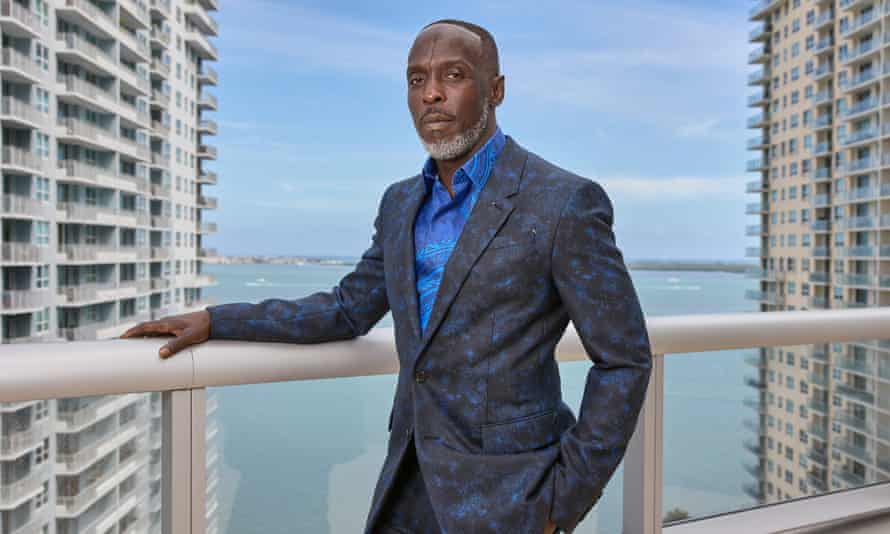 |
| Michael K Williams as Omar Little, the gay, dandyish highwayman who gets his kicks, and his cash, from robbing the mighty, murderous Barksdale clan in The Wire. |
Michael K Williams obituary
Barack Obama Stands by His Correct Pick of Omar Little As the Best Wire Character
Omar Little is the gay stick-up man who robs drug dealers for a living in The Wire
Michael K Williams / The Wire star remembered as 'a fine man and a rare talent'
Tuesday 7 September 2021
The binge-watching revolution began in the late 1990s, when the combined advent of quality US television and DVD box sets made that viewing method not merely possible but irresistible. Among the violent, intelligent adult dramas from that period – including The Sopranos and Deadwood – it was the Baltimore-set crime series The Wire, broadcast on HBO between 2002 and 2008, that was the most innovative and highly regarded.
Its creator, David Simon, conceived it as “Greek tragedy for the new millennium”. The novelist Nick Hornby likened the show’s democratic and colourful dramatis personae – drug kingpins and street-corner dealers, cops and politicians, hacks and teachers – to Dickens.
One eccentric figure towered above the rest: Omar Little, the gay, dandyish highwayman who gets his kicks, and his cash, from robbing the mighty, murderous Barksdale clan. As played by Michael K. Williams, who has died aged 54, Omar was enigmatic, seductive and defiant, not to mention confident enough in his own skin to pop to the corner store for cereal dressed only in a turquoise silk dressing gown. (“Omar coming!” cry the teenage dealers, scurrying away.)
An unapologetically gay character, let alone one whose sex life is shown with such frankness, was a novelty in the macho hothouse of the TV crime genre. “Omar’s a great guy,” said Barack Obama during his first presidential campaign. “That’s not an endorsement – he is not my favourite person – but he’s a fascinating character: a gay gangster who only robs drug dealers, and then gives back, sort of a Robin Hood. And he’s the toughest, baddest guy on the show, but he’s gay. It’s really interesting.”
Omar’s appeal derived from more than just his sexuality. A high-calibre writing team, including the crime novelists Dennis Lehane, George Pelecanos and Richard Price, ensured that he was eloquent and averse to profanity, and even permitted him to distil the show’s philosophy into an aside. When a lawyer accuses him of being a parasite, he responds: “I got the shotgun. You got the briefcase. It’s all the game, though, right?”
Asked in court how a man gets away for years robbing drug dealers and lives to tell the tale, he says coolly: “Day at a time, I suppose.” The character’s calm fearlessness was expressed by Williams’s natural poise and stillness. The scar that ran vertically down his face was a bonus. Williams received it after being slashed with a razor during a fight on his 25th birthday.
In the fifth and final season of The Wire, the apparently immortal Omar is killed at last – not by the Barksdales but by a twitchy child bandit. He dies instantly and ignominiously on the floor of a convenience store.

Williams enjoyed success in other acclaimed HBO series. Between 2010 and 2014, he starred in Boardwalk Empire, produced by Martin Scorsese, as the nattily dressed 20s Atlantic City bootlegger and racketeer Albert “Chalky” White. In The Night Of (2016), a remake of the BBC series Criminal Justice, he played a powerful inmate at Rikers Island prison, while in 2018, he presented Raised in the System, which tied in with his work as the American Civil Liberties Union’s ambassador for ending mass incarceration.
On Netflix, he played the father of one of the young men wrongly convicted of an attack on a jogger in Central Park in Ava DuVernay’s factually based drama When They See Us (2019). Most recently, he was Emmy-nominated for his role in Lovecraft Country (2020), a racially charged HBO series set in the Jim Crow era.
Williams was born and raised in Brooklyn, New York. His mother, Paula, was a seamstress who later managed a day-care centre. Williams rarely saw his father, from whom she was estranged. He was educated at George Westinghouse Career and Technical Education high school. After graduating, he got a job working at Pfizer, then quit to pursue his dream of becoming a dancer.
It was while appearing in the video for George Michael’s 1993 cover version of the Adamski song Killer that he was asked by the director to emote. “And the bulb just went off in my head. Literally, I had, like a revelation – like, ‘Oh shit, I’m actually acting!’” He went home that night, he said, and “just changed my résumé. I added the word ‘actor’ to ‘model/dancer’ and things started to shift.”

His big break came when the rapper and actor Tupac Shakur chose him on the strength of a Polaroid picture to play his brother in the thriller Bullet (1996). When Williams auditioned for three different roles in Scorsese’s Bringing Out the Dead (1999), the director was so impressed by his versatility that he cried: “Give him the part! Any part he wants! You’re a great actor.”
Work followed on television series including The Sopranos and Law and Order. But when The Wire came along, Williams was in debt, suffering from depression and on the verge of quitting acting. “Omar was life-changing for me,” he said in 2014. “I went so deep into his psyche that the lines of reality as to who was Michael and who was Omar got blurred. I had low self-esteem. I was, like, Mike is corny. I’m gonna be this Omar dude. It was like that was my Spider-Man suit.”

He had already been using cocaine while the show was running but it was once it ended that his addiction intensified. “I don’t know how I didn’t end up in a body bag,” he reflected in 2012.
Notable film work included Ben Affleck’s kidnapping thriller Gone Baby Gone (2007 ); Todd Solondz’s black comedy Life During Wartime (2008), in which Williams took over the role of a sex pest originated by Philip Seymour Hoffman in the same director’s 1998 film Happiness; Steve McQueen’s Oscar-winning drama 12 Years a Slave (2013); and Paul Thomas Anderson’s knockabout film of Thomas Pynchon’s comic crime caper Inherent Vice (2014).
He is survived by a son, Elijah.

No comments:
Post a Comment